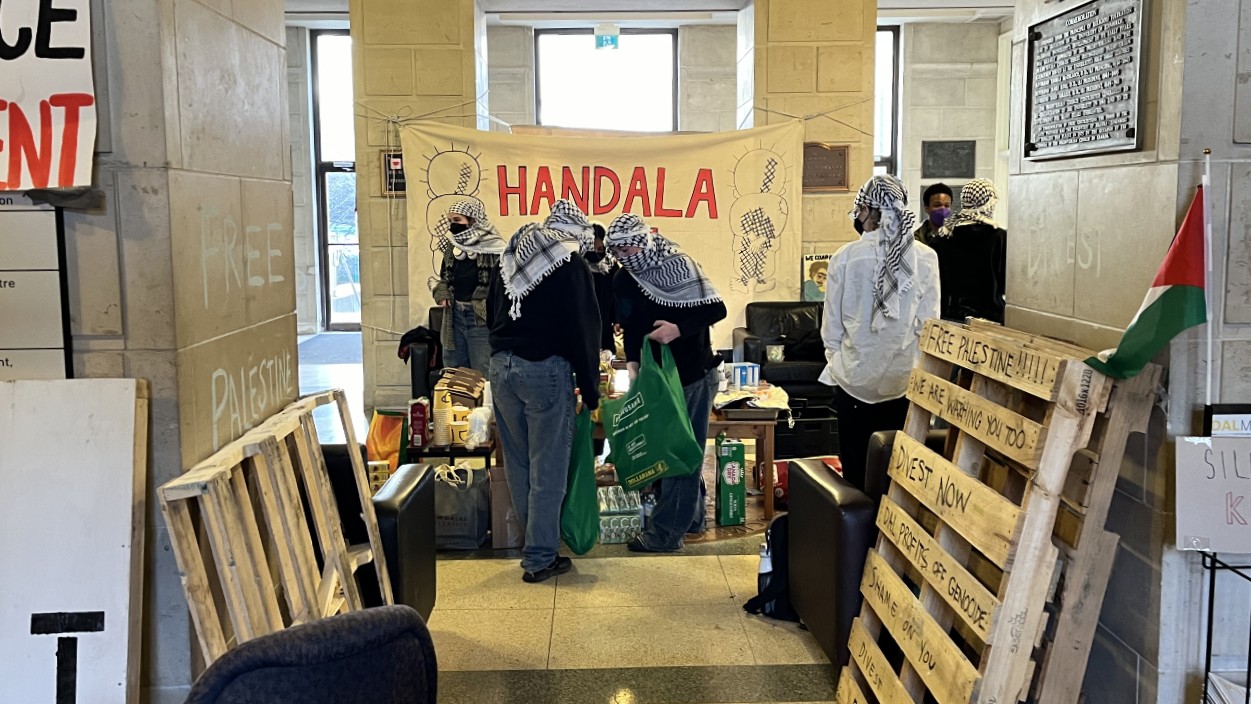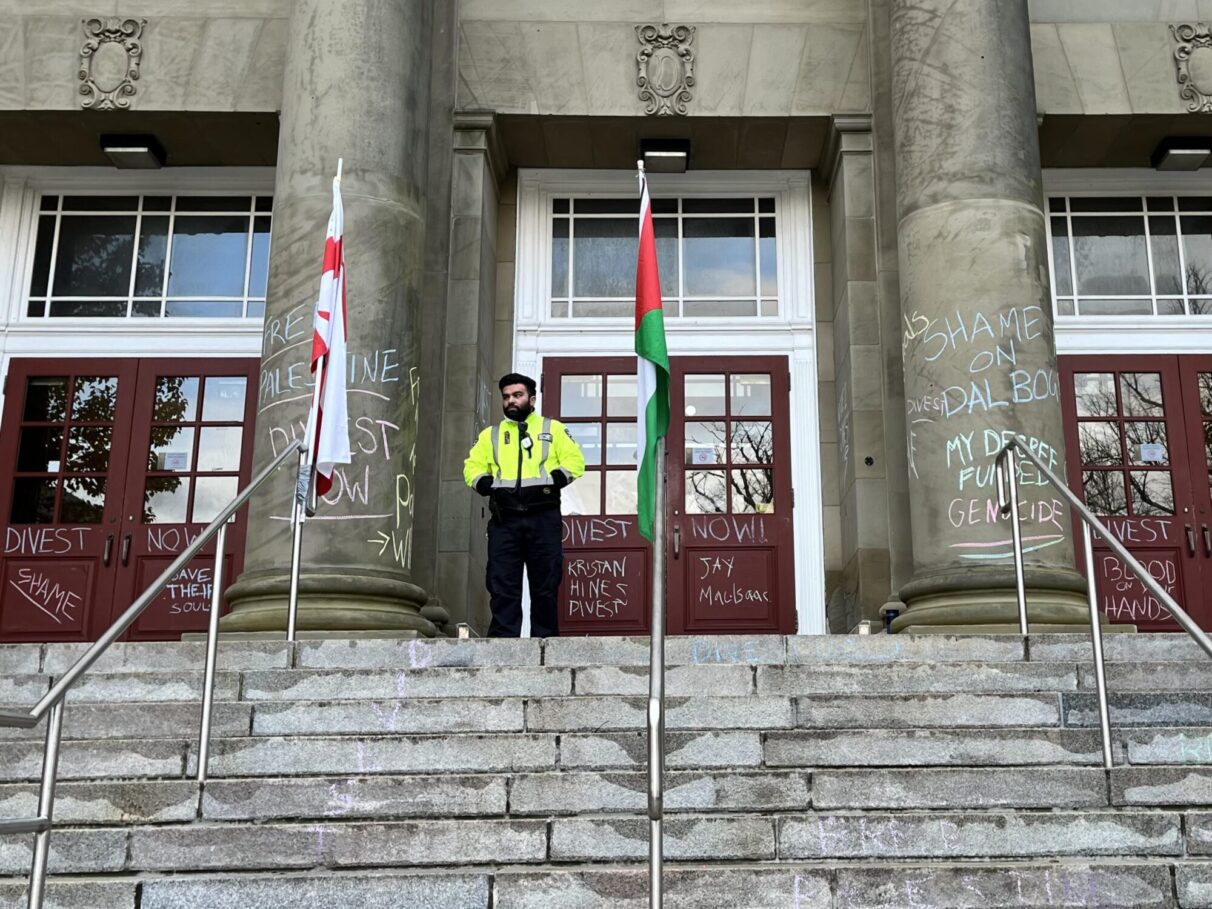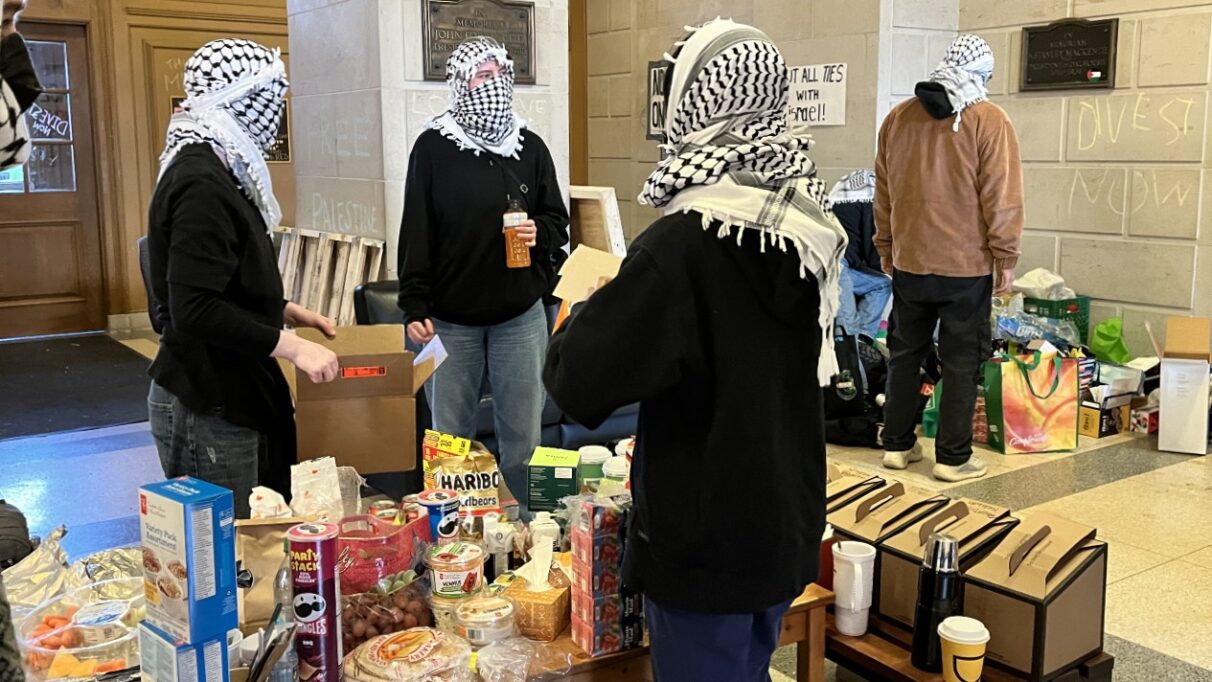Inside the student occupation of a Dal admin building
Protesters leave Henry Hicks Administration Building Thursday morning

caption
Students occupied the Henry Hicks Administration Building, calling it Handala Hall, after a board of governors meeting on Tuesday evening.Dalhousie’s Henry Hicks Administration Building will remain closed for the rest of the week, following a student occupation of the building, said university president Kim Brooks on Thursday.
Dalhousie will “continue to monitor campus activity and restore spaces to their original state,” said Brooks.
On Tuesday night, students protested a Dalhousie board of governors meeting by occupying the building, saying they’d refuse to leave “until divestment” from university investments in companies supporting Israel’s military action in Gaza. They called the building Handala Hall, after a Palestinian political cartoon.
The protesters left the building Thursday morning, on what they say were their “own terms.”
Chalk slogans, reading “divest now” were written on wood panel walls below portrait photos leading towards the Lord Dalhousie room, where the board meeting took place.
In a statement on Wednesday, Brooks said that “a group of protesters entered the meeting space in an aggressive and threatening manner.” Brooks announced the university had closed the building to the public.
The occupation was led by the Students for the Liberation of Palestine Kjipuktuk (SLPK). In a news release, the SLPK said the reason for the occupation was the “board of governors have voted against divestment from companies that aid and abet Israeli defiance of international law.”
“The motion did not pass, however another motion was presented to refer the matter to the board’s finance, audit, investment, and risk (FAIR) committee, which was passed,” said Brooks. “FAIR meets Dec. 12 and will provide an update back to the board of governors at its next meeting in February.”
Stand With Us Canada is an organization focused on combatting anti-Semitism and supporting Israel. In an online statement, they said “SLPK has abandoned constructive dialogue in favour of intimidation, disruption, and coercion.”
“This is not activism — it’s bullying at its worst and undermines the values that Dalhousie University has an obligation to protect,” they said.
Nothing threatening
A person identifying themselves as Emily Johnson, a second-year civil engineering student at Dalhousie, says that there was nothing threatening about the occupation. Johnson was wrapped in a kuffiyeh, a Palestinian scarf that protesters have been using to protect their identity.
When the protesters got the email statement, “there was a lot of laughter,” said Johnson in an interview with the Signal on Wednesday afternoon. “I think there’s just a lot of irony in what we saw in that message.”
Outside, a lone protester on a megaphone – also in a kuffiyeh – told passersby that they were welcome to enter Handala Hall. Security told them otherwise.

caption
A Dalhousie security guard stands outside of the Henry Hicks building on Wednesday afternoon.“Dal security, and other security which Dal has paid for, who have been telling people not to come in and that it’s closed and they’re not welcome in the building,” said Johnson. She says it was Dalhousie security who contributed to the tense feeling of the occupation.
The Henry Hicks is a historic, imposing building in the heart of the Dalhousie campus. Dozens of protesters crowded the small lobby of the building.
By Wednesday afternoon, protesters had moved couches and chairs into the lobby and were sleeping on the cushions. Students were asleep everywhere, some charging devices, others painting, some doing class work.

Response from Dalhousie
In an email to the Signal, Michael Fleury, senior manager of strategic communications and media relations said that the Henry Hicks was closed because protesters entered
“in an aggressive and threatening manner.”
Because the students refused to leave, Fleury said that “this represented an unacceptable risk to staff, faculty and students who might normally have business in the building.”
“The Hicks building will remain closed for the remainder of the week as we continue to monitor campus activity and restore spaces to their original state,” said Fleury. “We will not compromise the safety and well-being of our students, faculty, staff, and broader community members.”
About the author

Jennifer Waugh
Jennifer Waugh holds a BA in social justice from Saint Mary's University. In spring 2025 she will graduate with a Bachelor of Journalism degree...
